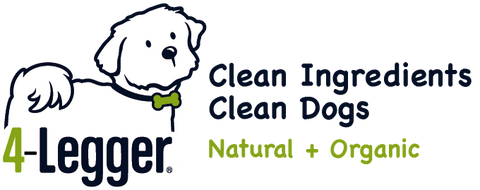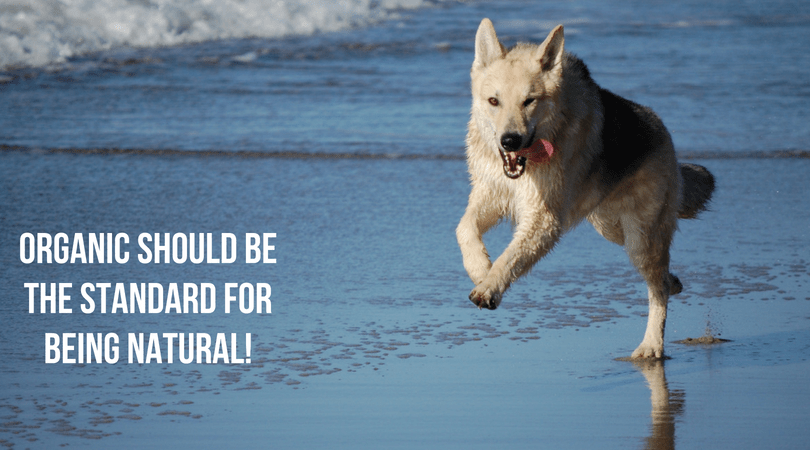The Word Organic Should Be A True All Natural Promise to Pet Parents
This past week a customer forwarded to me an email article about a new all natural dog shampoo and said upon receiving the email she was reminded how happy she was to have found 4-Legger for her furry family.
She said the email reminded her of the days she spent scouring ingredients and her frustration with manufacturers claiming they have the best organic dog shampoo when the products aren’t truly organic or all natural.
It was the same frustration we felt when we were trying to find a truly organic dog shampoo and couldn't find one so started 4-Legger!
What Does Natural Mean?
The words “all natural” and “organic” are so overused it makes you wonder some days if they truly mean anything at all.
4-Legger believes 100% natural dog shampoo means it contains no artificial or synthetic chemicals. All products (including water) are chemicals. The distinction between natural and not natural is whether or not the ingredient was derived using man-made chemicals (aka synthetic).
In 2016 this definition was backed by the Federal Trade Commission (FTC) who settled lawsuits against four separate companies who marketed their human products as "100% natural" or "all natural".
While many of the ingredients in their products were natural they also contained Phenoxyethanol (a preservative often found in dog shampoo making claims it is all natural and organic). Some of the other synthetic ingredients found in the products included Dimethicone, Ethyhexyl Glycerin, Polyethylene, Polyquaternium-37, Phenoxyethanol, Caprylyl Glycol, and Polyquaternium-7 - again ingredients we find in dog shampoos that make claims of being all natural and organic.
The outcome of these cases were crystal clear. If these companies produced products that contained synthetic ingredients they could not advertise them as all natural or 100% natural. If these companies now advertised and made these claims without reformulating and removing the synthetic chemicals they would face fines of $16,000 for each violation.
Unfortunately, it would seem the only way to get change to occur is to wait for the FTC to have a claim filed and legally enforce it. It does however mean that pet parents need to learn the differences between what is truly all natural and what is advertised as all natural.
What Does Organic Mean?
It may surprise you to discover the only companies that have to comply with how they use the word organic are the companies that actually sell USDA certified organic products!
Manufacturers can use the term "organic" on their products without penalty unless they claim the product (not the individual ingredients) are certified organic. Hence, thousands of dog shampoo manufacturers who claim their products are organic when they are not or products that contain certified organic ingredients when the product is not USDA certified organic get away with it.
The USDA will not enforce an organic claim unless the company also claims the product is certified organic to a standard. There is also no entity that will verify a company really is using a certified organic ingredient if they make a claim unless the product is USDA certified organic.
Let's look at chips. Yes, corn chips. A company makes USDA organic corn chips and has the USDA seal on the bag. During an annual ingredient review cycle, the USDA discovers from reviewing the paperwork the company has started to import one of their ingredients from another country. When those ingredients cross the international border they were sprayed with insecticides. The USDA forced the chip company to stop using the USDA seal while on suspension and from using the word organic in any and all of their marketing materials. If they use the word organic they will be fined $11,000 per instance. The company has a choice to make, find a new supplier and likely raise prices so they can go back to the USDA to demonstrate compliance or quit marketing as organic. They will have to also demonstrate their facility does not contain the contaminated product as the facility itself must be certified organic.
This validation from the USDA means something. It means manufacturers have an independent third party reviewing the ingredients from their growth in the field to when they are in the product.
4-Legger believes in the integrity of the USDA certified organic program. As stewards of this planet, we strongly feel agriculture practices must align with the mandates of the USDA certified organic program - free of synthetics like pesticides, chemical fertilizers, and dyes, and must not be processed using industrial solvents, irradiation, or genetic engineering.
Converting farm land to organic status is a three-year process.
There is a two-year conversion process consisting of building up the fertility of the land. Produce grown in the first year cannot be stated as organic. In the second year produce may be stated as “In Conversion”. It is not until the third year that produce may be stated as fully organic.
Some very important facts about organic farming everyone should know:
- Organic farmers don’t receive federal subsidies like conventional farmers. The price of organic food reflects the true cost of growing.
- The price of conventional food does not reflect the cost of environmental cleanup we pay for through our tax dollars.
- There is mounting concern over the safety of pesticides, herbicides and our food supply.
- Organic farming is more labor and management intensive. There is a lot more paperwork involved in organic farming!
- Organic farms are usually smaller than conventional farms and so do not benefit from the economies of scale that larger growers get.
It is a lot more work to comply with the USDA organic standards. We can proudly say we are both organic and truly all natural when others can make the claim but they can't back it up with third party validation!
We truly do care about the ingredients, our planet, and the integrity of the products that go on your dog!
We strongly feel a company shouldn't be able to say their dog shampoo is natural unless that product is USDA certified organic.
------------------------------------
Read more about the four companies the FTC barred from making false claims





